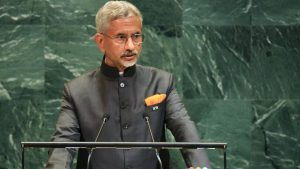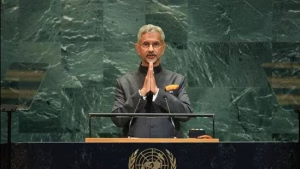New Delhi – India’s External Affairs Minister S. Jaishankar delivered a powerful message at the United Nations General Assembly (UNGA), warning the world about terrorism and indirectly pointing to Pakistan as its epicentre. In his sharp address, he underlined India’s long struggle against cross-border terrorism and highlighted how major global attacks trace back to a single source. The phrase Jaishankar On Pakistan At UNGA dominated discussions, as he warned that terror continues to threaten international peace and stability.
Strong Message on Terrorism
During his address, Jaishankar did not directly name Pakistan, but his reference was unmistakable. He described terrorism as a toxic combination of bigotry, intolerance, violence, and fear. Stressing that countering terrorism must remain a top global priority, he stated that India has faced this challenge since its independence, living beside a neighbor that serves as the epicentre of global terror. The assertion Jaishankar On Pakistan At UNGA became symbolic of India’s firm stand on exposing terror networks.
“That One Country” Reference

The foreign minister doubled down by noting that for decades, nearly every major international terror attack has been traced back to “that one country.” Without naming it outright, the implication was clear. He pointed out that United Nations lists of designated terrorists are filled with individuals of Pakistani origin. This remark again underlined the weight of the message Jaishankar On Pakistan At UNGA, highlighting India’s frustration with decades of unaddressed cross-border extremism.
Pahalgam Attack as Example
Jaishankar cited the Pahalgam terror attack of April 2025, in which over two dozen tourists lost their lives, as the latest example of cross-border brutality. This tragic incident, he argued, reflects how terrorism continues to strike at innocent lives and peaceful activities. In connecting this tragedy with his UNGA message, the phrase Jaishankar On Pakistan At UNGA reinforced the need for international cooperation in eliminating sanctuaries of terror.
India’s Right to Defend

The minister stressed that India has always exercised its right to defend its citizens from terrorism and has ensured perpetrators face justice. Referring to Operation Sindoor, he indicated how India’s decisive actions have neutralized threats and sent a message of deterrence. His warning, framed as Jaishankar On Pakistan At UNGA, was not only for India’s security but also for the global community that continues to face terror challenges.
Response to Pakistan’s Claims


His remarks followed Pakistan Prime Minister Shehbaz Sharif’s claim at the UNGA that his country had “won the war” after the Pahalgam incident. India’s diplomatic representative, Petal Gahlot, immediately countered these statements, noting that Pakistan’s military had actually pleaded for a halt to fighting. She stressed that photographic evidence of destroyed infrastructure in Pakistan proved the scale of damage caused during Operation Sindoor. Against this backdrop, Jaishankar On Pakistan At UNGA became a defining counterpoint to Islamabad’s narrative.
Shared Global Threat
Beyond South Asia, Jaishankar emphasized that terrorism is a shared global threat requiring stronger cooperation among nations. He warned of the dangers when states openly adopt terrorism as part of official policy. In this wider context, the reiteration of Jaishankar On Pakistan At UNGA served to remind the international community that ignoring state-sponsored terror risks destabilizing multiple regions simultaneously.
Wider Global Conflicts
In addition to his focus on terrorism, Jaishankar touched upon two major ongoing conflicts—the war in Ukraine and the crisis in Gaza—as well as several other hotspots often ignored by international attention. By broadening the conversation, he linked the fight against terror to broader concerns of global security. Still, the insistence on Jaishankar On Pakistan At UNGA remained central, ensuring that Pakistan’s role as a terror hub stayed under global scrutiny.
India’s Consistent Stand
Over decades, India has consistently flagged cross-border terrorism as its foremost national security challenge. This continuity was echoed once again in New York, showing how deeply the issue remains embedded in India’s diplomacy. The phrase Jaishankar On Pakistan At UNGA represents not just a speech but a continuation of India’s diplomatic push to isolate state sponsors of terror and demand accountability.
Call for Global Unity
Closing his address, Jaishankar urged nations to stand together against terrorism. He said unity is essential to dismantle networks, deny safe havens, and ensure justice for victims. By repeatedly stressing the message of Jaishankar On Pakistan At UNGA, he left the international community with no doubt that ignoring this issue would come at a global cost.

